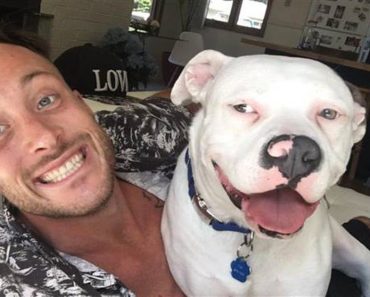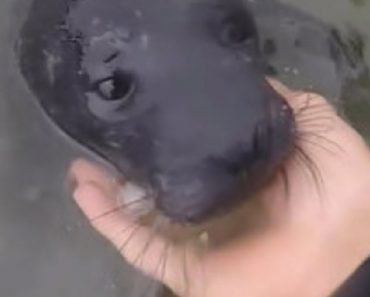Eighty-five dogs have been rescued from a notorious canine meat market where customers choose from live animals in cages to be slaughtered on order.
The dogs, mostly Korean Jindo mixes, were freed by charity workers today as the Gupo dog meat market in Busan, South Korea, was forced to shut down.
The terrified animals were found cowering in their cramped cages and had to be physically pulled out.
They were rescued as part of a crackdown on the dog meat trade and have been placed in temporary shelters.
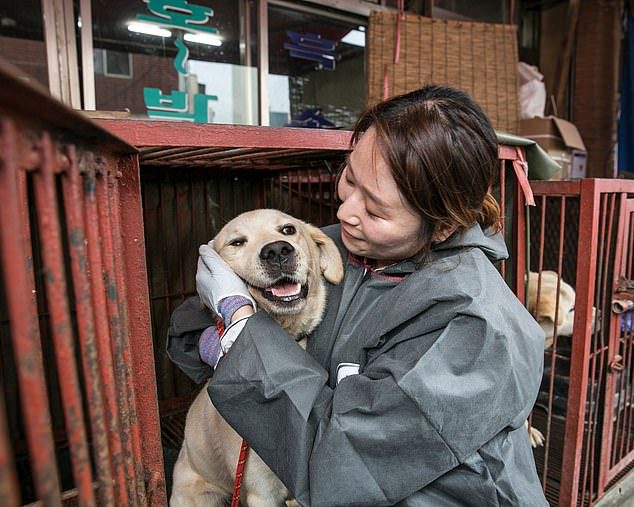
An animal charity worker comforts one of the dogs at the Gupo dog meat market in Busan, South Korea
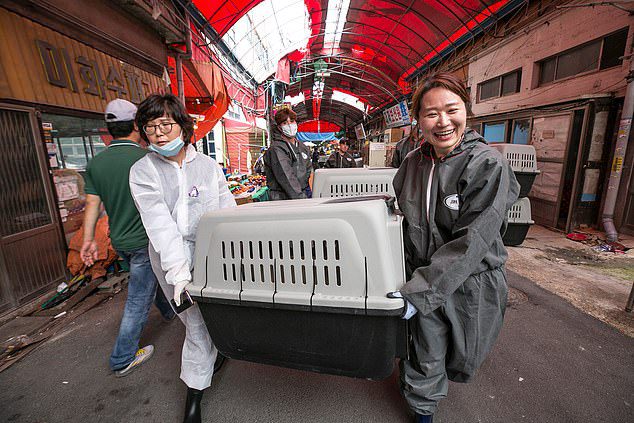
Eighty-five dogs were rescued from the notorious canine meat market and put in animal shelters as the country cracks down on the dog meat trade
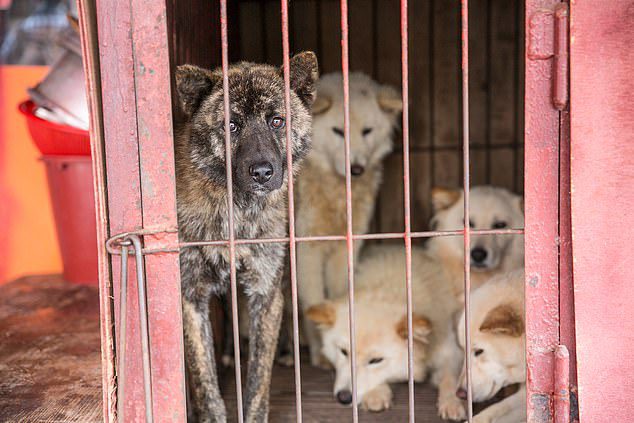
The terrified animals were found cowering in their cages and had to be encouraged out by charity workers
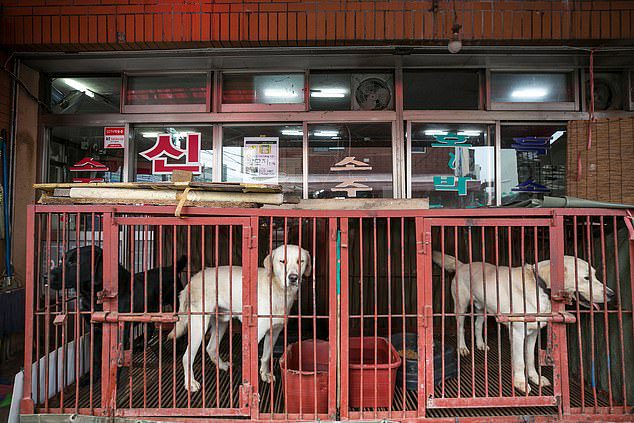
The dogs had lived their entire lives in cages and were born and bred on dog farms for slaughter
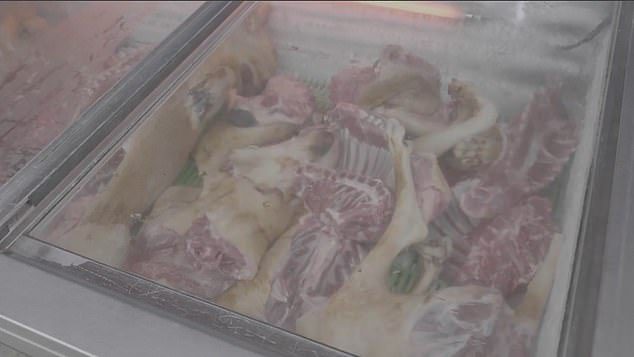
Chilled canine flesh on display in clear fridges at the Gupo dog meat market
The dogs had lived their entire lives in cages and were born and bred on dog farms for slaughter.
Death by electrocution is most common, with dogs usually taking up to five minutes to die.
There have even been instances of dogs taking up to 20 minutes to die and hanging is also practiced. The animals are killed in full view of other dogs.
The Gupo market was shut as part of an urban planning project to turn it into a public park.
Nara Kim, dog meat campaigner for Humane Society International (HSI), who attended the closure and rescue, said: ‘For decades they have stood as a very public symbol of the immense cruelty of the dog meat trade, with live dogs displayed in cages on the street for shoppers to select for slaughter by electrocution.
‘The closure of Gupo’s dog meat market means the end of a gruesome era in South Korea’s dog meat history, and a sign of the times that law enforcement and local authorities are cracking down on this increasingly unpopular industry that most Koreans want nothing to do with.
‘I know we have a long way to go to end the dog meat trade here, but even two years ago I would never have believed we would see such progress.
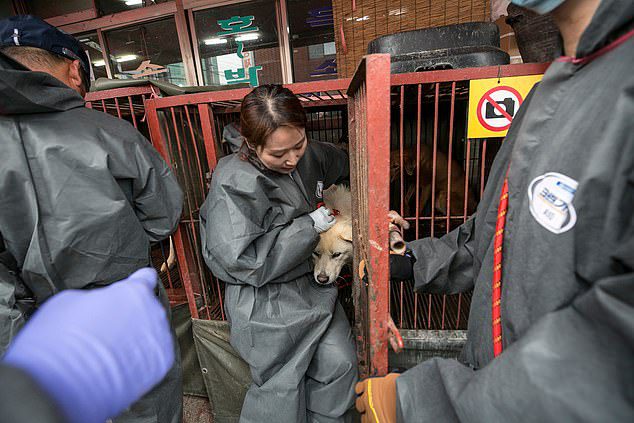
One of the dogs has to be physically pulled from its cage as it was too frightened to come out
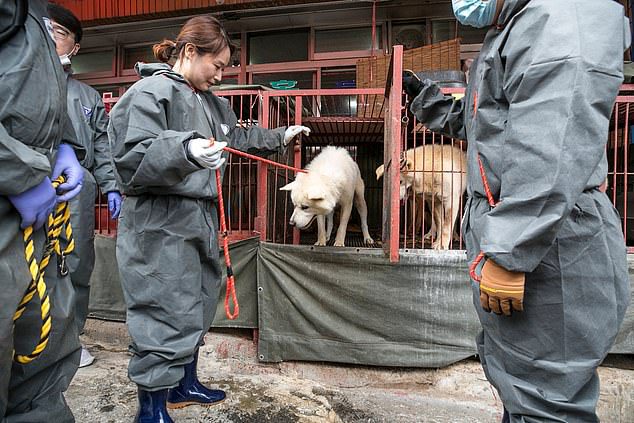
Most dogs at the Gupo market were killed by electrocution – which often took five minutes to kill them
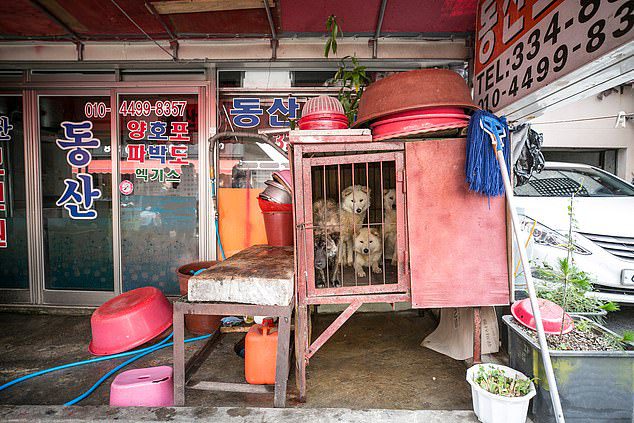
At least four dogs are seen cowering in a cramped cage at the notorious market
‘It has been a pleasure to work with the Busan authorities, and especially in being able to save the last remaining dogs we found alive.’
The closure of Gupo is the latest in a series of crack downs by officials on the dog meat trade.
In November last year, Seongnam city demolished Taepyeong, the country’s largest dog slaughterhouse, and closed down most of its related dog meat vendors.
Earlier this year, Seoul mayor Park Won-soon vowed to close all dog butcheries in South Korea’s capital city after watching an animated show about abandoned dogs.
Most people in the country don’t regularly eat dog but it remains popular during July and August when it is eaten as a soup called bosintang.
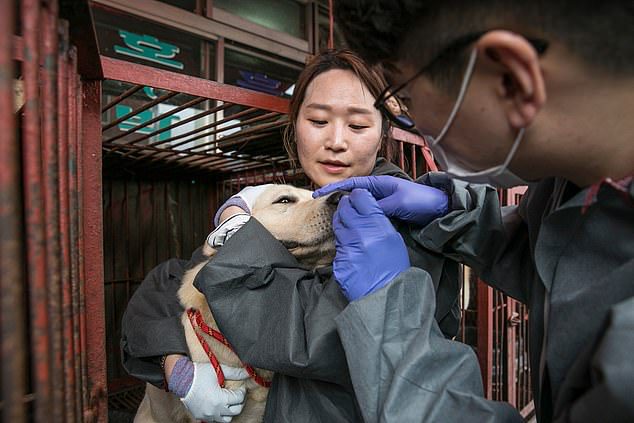
One of the dogs is inspected before being taken into care by charity workers
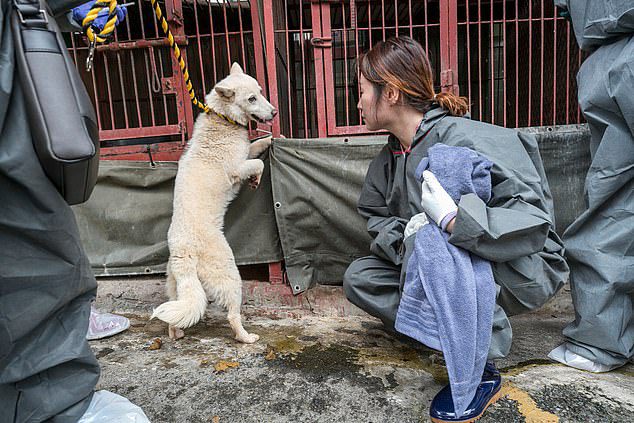
Earlier this year, Seoul mayor Park Won-soon vowed to close all dog butcheries in South Korea’s capital city after watching an animated show about abandoned dogs
At the height of business at Gupo in the 1970s and 1980s, the market housed around 60 dog meat shops but after the Seoul Olympic in 1988, it started to decrease.
Just 17 dog meat vendors and two dog tonic shops remained before today’s closure.
Humane Society International’s rescue team was on site to assist the closure and rescue with partners KARA, KAWA and Busan KAPCA.
It’s thought there are more than 2million dogs bred on thousands of dog meat farms across the country.
Increasingly dog farmers are abandoning controversial trade due to the growing stigma.
HSI’s Nara Kim said: ‘The dog market scene was really upsetting, with dogs displayed in cages in front of each store.
‘The smell was overwhelming. HSI has closed down 14 dog meat farms in South Korea and rescued nearly 1,800 dogs, all of whom would have ended up in a terrible place just like this.
‘All the dogs at Gupo have been removed and transported to a temporary shelter where they will recover from their ordeal.
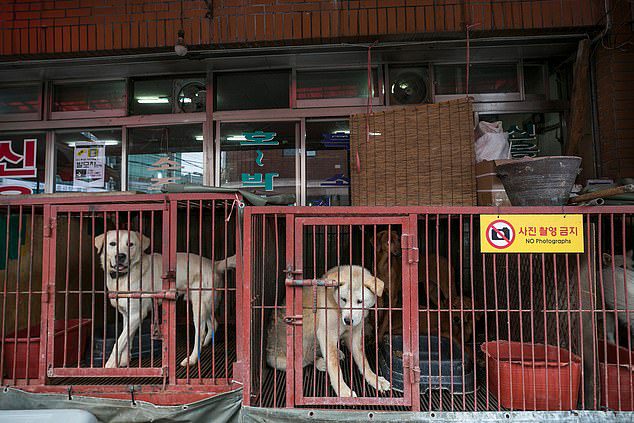
Most people in the country don’t regularly eat dog but it remains popular during July and August, when it is eaten as a soup called bosintang
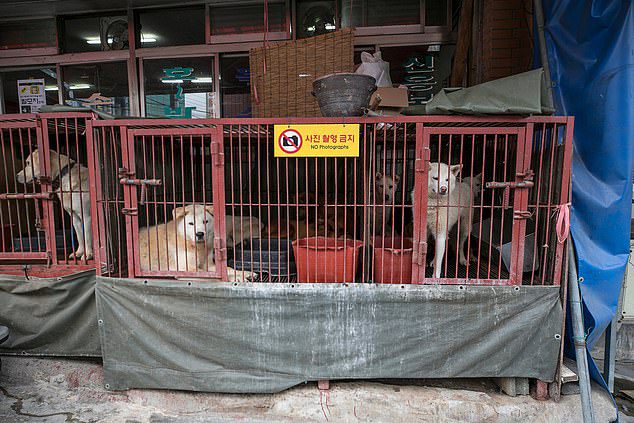
It’s thought there are more than 2million dogs bred on thousands of dog meat farms across the country
‘A few will remain in Korea to find new homes, but HSI will fly all the others overseas to Canada or the United States to get the love and care they deserve before being placed with shelter and rescue partners who will seek adoptive homes.’
Kim Ae-ra, president of Busan Korean Alliance for Prevention of Cruelty to Animals, said: ‘We started anti-dog meat protests in front of Gupo dog meat market for the first time in 2007 and so we are deeply moved that the market will be the first complete shutdown of its kind in Korea.’
Yim Soonrye of Korea Animal Rights Advocates, said: ‘Dog slaughterhouses are collapsing one by one, from Seongnam Moran Market to Taepyeong-dong and Busan Gupo Market, and in addition Gyeonggi Province has introduced its own judicial polices to crack down on illegal dog slaughterhouses.
‘This all shows that the Korean dog meat industry is starting to fall. As local governments are moving forward, the Korean government must also take action by closing all illegal dog farms, by the Blue House keeping its promise to exclude dogs from the legal definition of ‘livestock’, and by the National Assembly passing the proposed bill to end the dog meat industry before the end of next year’s session.
‘We welcome the decision made by Busan Metropolitan City and the merchants of Gupo, and believe that the shutdown of Gupo dog market will be a major stepping stone towards ending dog meat in Korea.’
Cho Hee-kyung, president of Korean Animal Welfare Association, said: ‘The permanent shutdown of Gupo dog meat market is a long-awaited victory against animal cruelty in our campaign to end the dog meat trade in South Korea. We will now step forward to call for the shutdown of Chil-seong market, another large dog meat market in Daegu.’
If you know someone who might like this, please click “Share”!


